“How do I know what I think
until I see what I say?”
Joan Didion
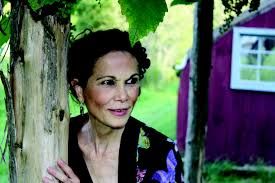 Julia Alvarez spoke at the Arlene Schnitzer Concert Hall in downtown Portland, the final event of the 2014 Arts & Lecture series–and I left inspired.
Julia Alvarez spoke at the Arlene Schnitzer Concert Hall in downtown Portland, the final event of the 2014 Arts & Lecture series–and I left inspired.
She spoke of story and of possibility. She spoke of how books change lives and the best writing surprises the writer. She believe to live as a poet is a political act. It means stepping out. It means making choices that often won’t fit nicely onto a resume. It means writing about what matters and revealing what won’t stay hidden any longer.
She told about her arrival in 1960 to New York City and showed a photo of her sixth-grade self. Her family fled the Dominican Republic after her father’s involvement in an attempt to assassinate Trujillo–the cruel dictator who reigned for more than thirty years over that island country bordering Haiti.
She wasn’t a reader back then, but she had grown up surrounded by story. In New York, she had a teacher who encouraged her to write down stories of the family she dearly missed.
“Then you won’t be lonely,” her teacher said.
Julia also met the library–and began to read books.
Once she began to study writing, years later as a graduate student, Julia Alvarez would realize she already knew about plot, character development, setting and climax because her family had taught her the art from at an early age through the oral tradition.
“People say it takes a village to raise a child. Well, my family was a small village,” she said, beaming a black and white photo onto the back-wall of the stage, a huge gathering of people. Her father was the youngest of 25! His father’s first wife died–not of childbirth–after bearing ten children. His second wife bore fifteen.
I kept leaning forward, closing my eyes, taking in her words, the images, her graceful sharing. Though she lives and teaches in Vermont, she and her husband spend lots of time in the Dominican Republic these past decades–and they even own a coffee plantation with the purpose of keeping land in the hands of small farmers rather than leaving the land to profit agribusiness.
Julia began writing when there was no such thing as “Latino-American” or “Asian-American” writers–and few women made the canon. She had no models. Instead, she would become a other’s inspiration though didn’t publish her first novel until age 41, the same years she earned tenure at Middlebury College where she still teaches. How the Garcia Girls Lost Their Accent debuted in 1991.
Some years ago she was talking with a young Haitian man who was kept busy working on an all-male crew in the Dominican Republic. The young man felt dreary and already hopeless about his life.
“Don’t worry,” she said. “You will meet a wonderful Haitian woman, marry her and have a family someday.”
He scoffed because he couldn’t imagine such a life for himself. She returned to Vermont and heard from the young man about eight years later. “I’m getting married next week. Can you come?”
Her latest book, A Wedding in Haiti, tells this story.
What strikes me is not only the power of story but the possibility in words: When we say something aloud–or write it on walls or paper–shifts occur.
Julia Alvarez opened the young man’s world when she offered a smiling vision of his future, a time when he would be successful and belong. The words painted hope. Yet the opposite is also true: Words have the power to harm. They can stick and be remembered for a very long time. When a teacher or parent tells a kid she’s never going to amount to much, damage is done.
And, the more specific, the more power words wield. Create an image for our listener, and the recipient may carry this–gift or curse–for years or forever.
Someone asked Julia Alvarez where she feels most at home: “When writing because when I write I learn what I think.” These words reminded me of a long-ago gift, when I read “How I Write” by Joan Didion.
“How can I know what I think until I see what I say?” I was a senior at the University of Washington. “Yes!” I thought. “That’s how I feel sometimes. I’m not alone,” I realized. Other people are like me. They know themselves better and feel less crazy when they write their thoughts–words onto the page. Some of us discover our way by writing our thouhts!
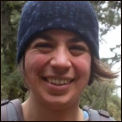 Surely Sarah Kinsel understands this notion, too–though she is also a splendid speaker.
Surely Sarah Kinsel understands this notion, too–though she is also a splendid speaker.
I’m lucky enough to sit next to Sarah some mornings and write–just after sunrise in the winter months. Sarah Kinsel, MDiv, is a lifelong student of wilderness, leads awareness hikes and retreats for writing, renewal and reflection. She invites participants to look for creative openings and listen for deeper connections with the natural world. 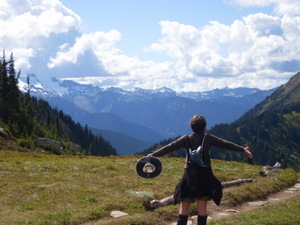 These programs grow out of her call to protect and nurture what is sacred, wild and creative–in ourselves, in others, and in the earth.
These programs grow out of her call to protect and nurture what is sacred, wild and creative–in ourselves, in others, and in the earth.
She is currently living into her callings as mama, interim pastor, and writer.
Enjoy these gorgeous lines that invite us to be who we are, to judge less, to leave ourselves open to possibility. May this poem be whatever it is to you. Thanks for being here–and pass these lines along if you know someone who it might nourish.
If You Lay Aside Your Drum
If you lay aside your drum, your violin, your tambourine,
let it be only to sleep
–the deep rest of the celebrated–
or to sit or walk quietly
with the joy or pain in your own heart
or the heart of another,
to sit in the forest and breathe:
hold, release, beckon, repeat.
Take a break from ferreting out
what is useful in this life.
Let your use be your body
or the instruments before you.
We are made for song and dance and silence
just as much– or more– than we are made
for work, for use, for scheming of any kind.
Open the best wine (grapes bent to our use, now released).
Lift a tambourine (wood bent to our use, now singing).
Lift your feet, and as your eyes
take in the rising moon,
know it is there for its own sake, not ours.
And if your mind needs to make something of it,
let it be a blessing, a round or crescent
clarion call to be with the night.
Sarah Kinsel
–
Links:
Julia Alvarez’ Official Website: http://www.juliaalvarez.com/
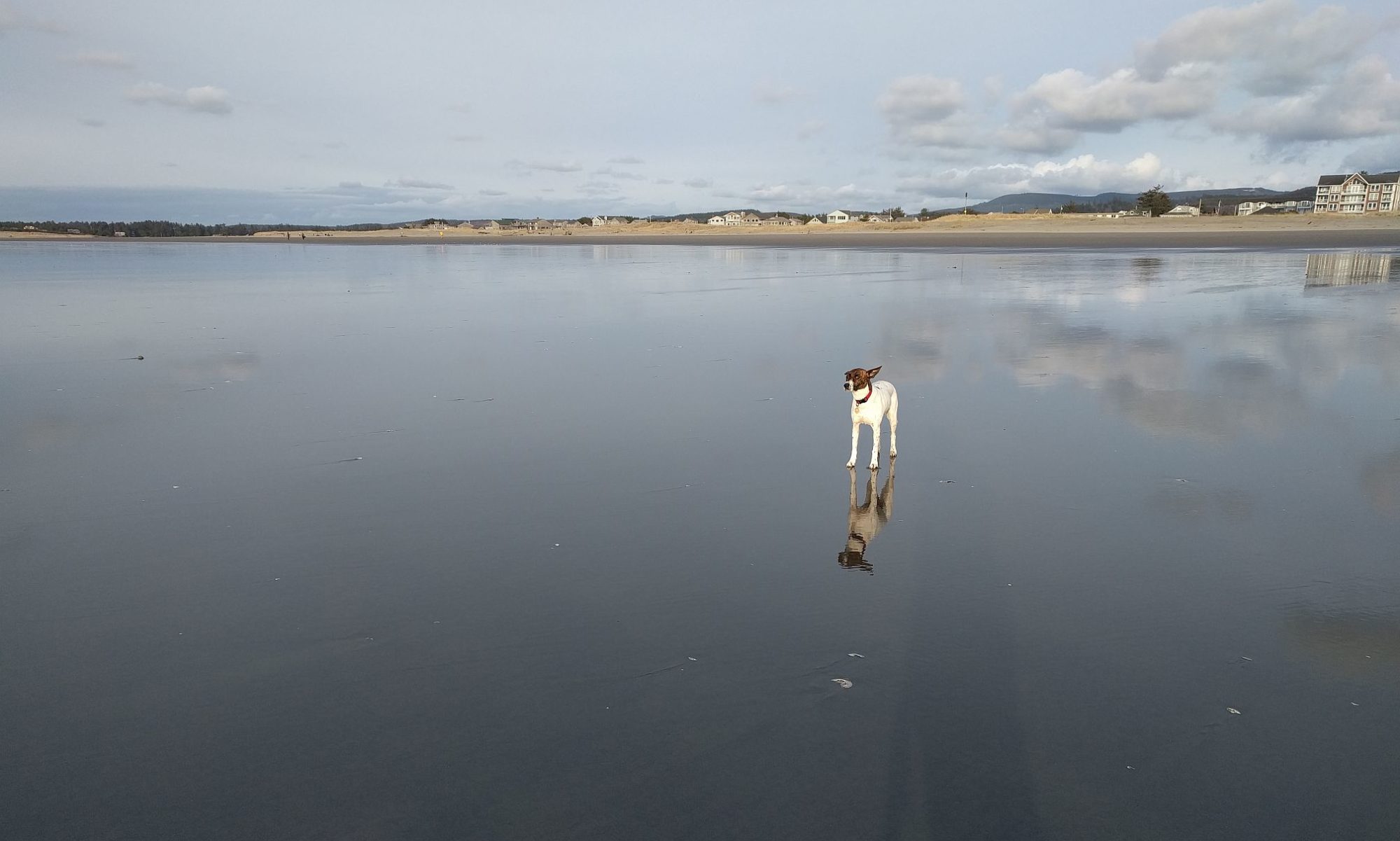

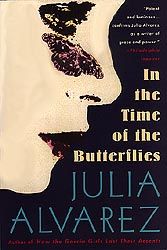
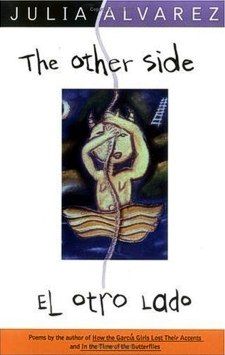
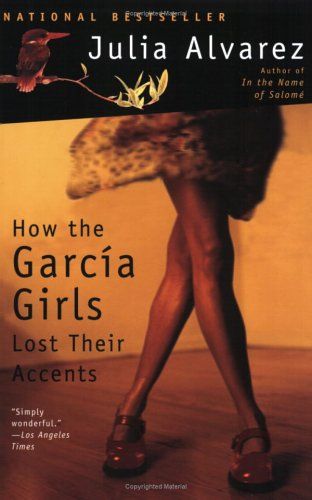
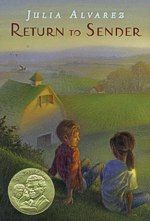
A splendid read. Thank you!
Well said, well written. I love this from Julia “to live as a poet is a political act. It means stepping out. It means making choices that often won’t fit nicely onto a resume. It means writing about what matters and revealing what won’t stay hidden any longer.” i LOVE Sarah’s poem.
A powerful and resonating image from Sarah Kinsel:
“We are made for song and dance and silence”
Thank you for sharing your recent experience and the reminder of how the creation of art IS activism in action!
I enjoyed reading about these women and how you experienced them–how they enriched your life.
Thanks Deborah. I’m glad you enjoyed her talk.